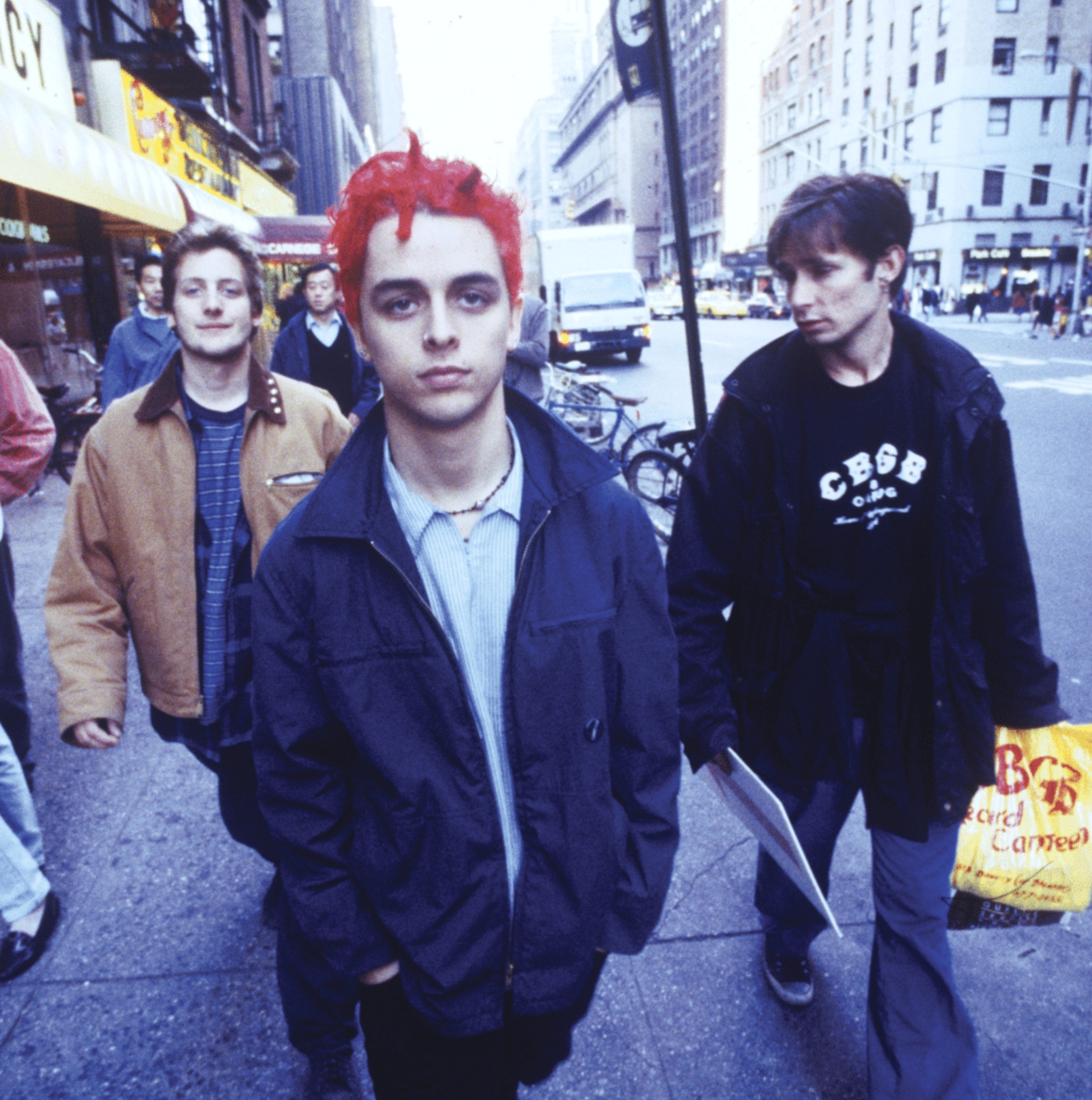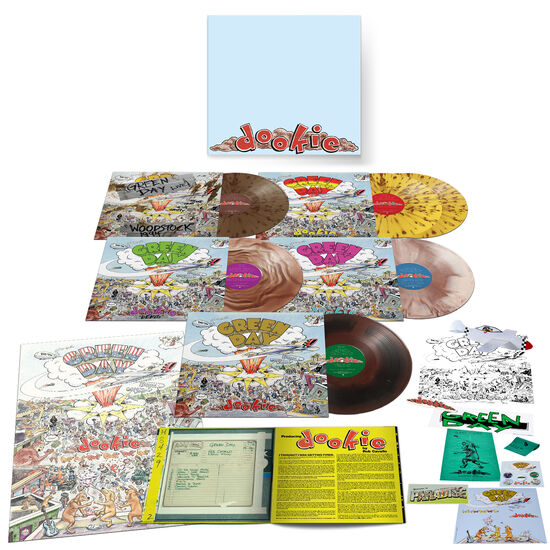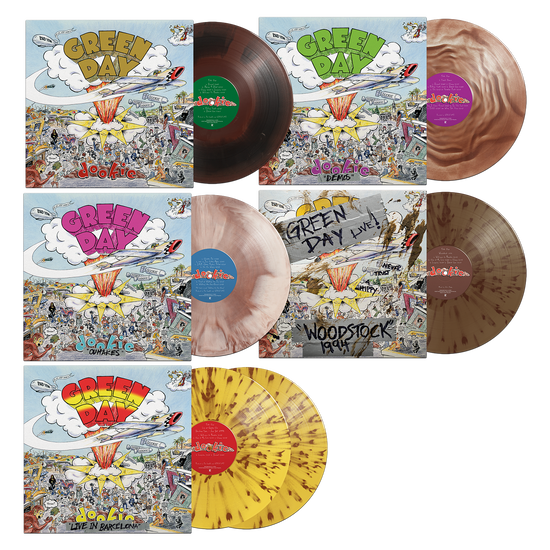Green Day’s “Dookie” Celebrates 30 Years
A super deluxe box set done right
 Grunge was the leading musical movement by the turn of the 1990s; its successor emerged from the Bay Area punk scene. Green Day became a household name around 1991 with a sound merging the intensity of hardcore punk with melodic power pop twists. Local label Lookout Records released their first two albums 39/Smooth and Kerplunk, the latter becoming the label’s best-selling release. Independent, limited distribution labels didn't typically sell out of initial 10,000 copy pressings in one day. Green Day started to outgrow its reach; a bidding war arose amongst major labels wanting to sign the band. Free meals, trips to Disneyland, and A&R reps tattooing the band’s name on their ass wasn’t enough to entice them. Producer Rob Cavallo devoured the band's demo and understood the group better than anyone; Green Day signed with Warner/Reprise in 1993. Frowned upon in the eyes of the punk establishment is the idea of "selling out." In Green Day’s eyes, it was merely an exercise in seeing how far they could take their artistry to a larger demographic. Signing with a major label helped the band bridge the gap between the DIY aesthetics of punk and the mainstream.
Grunge was the leading musical movement by the turn of the 1990s; its successor emerged from the Bay Area punk scene. Green Day became a household name around 1991 with a sound merging the intensity of hardcore punk with melodic power pop twists. Local label Lookout Records released their first two albums 39/Smooth and Kerplunk, the latter becoming the label’s best-selling release. Independent, limited distribution labels didn't typically sell out of initial 10,000 copy pressings in one day. Green Day started to outgrow its reach; a bidding war arose amongst major labels wanting to sign the band. Free meals, trips to Disneyland, and A&R reps tattooing the band’s name on their ass wasn’t enough to entice them. Producer Rob Cavallo devoured the band's demo and understood the group better than anyone; Green Day signed with Warner/Reprise in 1993. Frowned upon in the eyes of the punk establishment is the idea of "selling out." In Green Day’s eyes, it was merely an exercise in seeing how far they could take their artistry to a larger demographic. Signing with a major label helped the band bridge the gap between the DIY aesthetics of punk and the mainstream.
Released in February 1994, Dookie became one of the albums that defined both punk rock and the 1990s. With singles “Longview,” “Basket Case,” “Welcome to Paradise,” and “When I Come Around” receiving heavy rotation and becoming both MTV and radio staples, the album was hard to avoid. This prominence was crucial in phasing out grunge’s mainstream appeal to one that was musically uplifting. Lyrically, Dookie was far from uplifting. The album marked a turning point for Billie Joe Armstrong as a writer. The 20-year-old guitarist/vocalist shifted from writing about marijuana-infused adolescence to the impending doom of early adulthood. Growing up in a dysfunctional family, anxiety, and boredom were universal concepts that made Dookie a soundtrack for the disenfranchised youth of the time. The album would sell 10 million copies and become a pop-punk bible for bands like Blink 182 and Fall Out Boy to follow.
Green Day’s contract with Warner/Reprise concluded in 2020. The label continues to do justice to the catalog with various anniversary releases. In addition to a release's remaster the anniversary packages also include unreleased studio and live material. It would be a sin for An album as monumental as Dookie demands such jubilee treatment.
The Dookie 30th anniversary super deluxe box set released four months shy of the album's 30th anniversary offers a treasure trove of material that enhances the revisit to one of the '90's monumental albums.
 Thirty years after its initial release, Dookie holds up well with 14 memorable nuggets of heavy melodic punk rock. Nasal vocals, crunching power chords, counter-melodic bass lines, harmonies, and intricate drumming became a consistent winning formula. It’s hard to imagine touchy subjects, such as the mass murder lunacy of “Having a Blast” and the discovery of sexual identity in “Coming Clean,” to be tackled with catchy melodic hooks. The only moment for the listener to catch his or her breath is the first half of “F.O.D.,” before the aural assault of the band kicks in. An unlisted coda, the suggestive "All By Myself", rounds off the album with a comedic twist.
Thirty years after its initial release, Dookie holds up well with 14 memorable nuggets of heavy melodic punk rock. Nasal vocals, crunching power chords, counter-melodic bass lines, harmonies, and intricate drumming became a consistent winning formula. It’s hard to imagine touchy subjects, such as the mass murder lunacy of “Having a Blast” and the discovery of sexual identity in “Coming Clean,” to be tackled with catchy melodic hooks. The only moment for the listener to catch his or her breath is the first half of “F.O.D.,” before the aural assault of the band kicks in. An unlisted coda, the suggestive "All By Myself", rounds off the album with a comedic twist.
The supplementary material starts with the 4-track demos that sold Rob Cavallo on the group. These recordings make for a portal into Green Day’s creative world with an embryonic rendition of “Basket Case” with alternate lyrics and stripped-down arrangements of “When I Come Around” and “In The End.” A noteworthy feature is the piano ballad “When It’s Time,” which debuted in 2009 in the Broadway adaptation of Green Day’s punk rock opera American Idiot. The arrangements found on the cassette demos are identical to how they appear on the album and sound like Dookie recorded on Lookout’s recording budget. These demos also provide insight into how future Green Day songs evolved. An early demo of what would appear on 1997’s Nimrod, “Haushinka,” recycles a riff to craft “Walking Contradiction” on 1995’s Insomniac.
There are some recognizable studio outtakes during the time Green Day recorded Dookie. As a warm-up to the intimidating setting of Fantasy Studios, the band ran through some of their Lookout repertoire, such as “Christie Road” and “409 In Your Coffeemaker.” The unused “J.A.R. (Jason Andrew Relva)” found its way on the soundtrack to the film Angus. “Only of You” and their take on The Kinks’ “Tired of Waiting For You” became B-sides and were later featured on the compilation Shenanigans.
Green Day’s performance at Woodstock ‘94 played a huge role in the band’s rise to mainstream fame. A pay-per-view audience of millions witnessed the band blitz through a ten-song set that resulted in a mud-slinging fest with the crowd. Green Day was “the band of the day,” just like Queen was at Live Aid. Originally released as a limited Record Store Day release in 2019, this recording deservingly gets a widespread release.
A full live document from the Dookie tour comes in the form of a show at Garatge Club in Barcelona. Partially broadcasted by Westwood One and bootlegged for years, the full release of this show is a first. In addition to material from the band’s three albums, Green Day pays homage to their roots with a cover of Operation Ivy’s “Knowledge.” The performance is tame compared to the monstrous scale of Woodstock ‘94. A more intimate setting allowed the band to hone in exclusively on the music.
Chris Bellman had cut lacquers for the bulk of this set. Whether it's the lo-fi 4-track demos or the professionally recorded Barcelona show, Bellman is a member of the mastering engineer elites who can make anything sound exceptional regardless of source quality. I say “bulk” because the metal parts used specifically for the Dookie album are from an anonymously cut picture disc done in 2017 by Pirate Press, an American front for the Czech Republic’s GZ Vinyl. I can’t vouch for a top-dollar original pressing, but most listeners consider the readily available and affordable Kevin Gray cut from 2009 a sonic masterpiece. I can imagine a hypothetical Bellman cut being at the same caliber, but the decision to use the picture disc cut is unknowingly baffling. It still sounds massive and captures the roomy sound of the album. The tom fills and bass lines on “Longview” pop out of the speakers. The downside is the inner groove distortion towards the end of the sides, especially Billie’s vocals on “Basket Case.”
The 36-page book includes writeups from Rob Cavallo and journalist Bob Mehr, who provides insightful background behind the genesis of Dookie and the impact it made upon its release. Many of the candid on-and-off stage photos provide a fly-on-the-wall perspective of being around these punks turned stars, not to mention how often their hairstyles changed! This box set has all of the trinkets that make super deluxe box sets as immersive as they are, such as posters, magnet sheets, buttons, stickers, postcards, and… dog poop bags? The idea of having an air freshener in a box set devoted to Dookie is tongue-in-cheek. If someone is feeling daring to break the seal, comment the aroma down below!
 GZ Vinyl pressed both the standard black and indie exclusive colored variants (presumably limited and numbered out of 20,000 copies). The single-sided outtakes LP comes with an etched rendering of the album artwork on the flipside. If you’re one for visually stimulating vinyl, the indie exclusive colored variant is stunning with various color-inside color, marbled, and splatter patterns. Housing the records in crummy white paper sleeves did result in some faint hairline scratches on the surface of all the records. Luckily, all LPs played back smoothly with no audible discrepancies. A box set with a retail price of $174.99 is deserving of having at least polylined inners at the expense of dog poop bags.
GZ Vinyl pressed both the standard black and indie exclusive colored variants (presumably limited and numbered out of 20,000 copies). The single-sided outtakes LP comes with an etched rendering of the album artwork on the flipside. If you’re one for visually stimulating vinyl, the indie exclusive colored variant is stunning with various color-inside color, marbled, and splatter patterns. Housing the records in crummy white paper sleeves did result in some faint hairline scratches on the surface of all the records. Luckily, all LPs played back smoothly with no audible discrepancies. A box set with a retail price of $174.99 is deserving of having at least polylined inners at the expense of dog poop bags.
Between audio content with substance, an in-depth booklet, gorgeous-looking vinyl, and all the extra trappings, the 30th anniversary super deluxe Dookie is a prime example of how to successfully execute a box set that gives value for your hard-earned money.














































